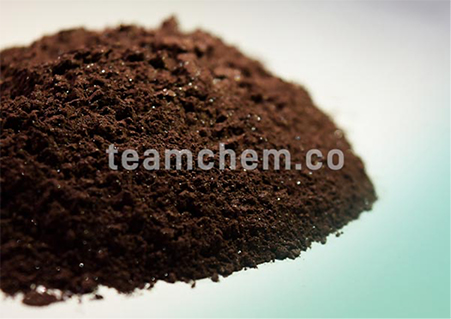To perform drilling operations in deep wells it is necessary to use drilling mud with different composition and specific weighting agents.
To perform drilling operations in order to create deep wells and extract oil, it is necessary to use drilling mud with different compositions. Drilling mud is typically divided into two groups: water-based mud (WBM) and oil-based mud (OBM). Water-based mud contains clay, weighting agents and special chemicals in an aqueous phase. On the other hand, oil-based mud, contains a hydrocarbon phase with a saline phase of water with clay, weighting agents (barite) and other additives.
In this article most important drilling fluids weighting agents are introduced. Hematite can be used as weighting agent in drilling fluids, which can be used in water-based and oil-based mud. Another weighting material that is discussed below is calcium bromide, which is one of the expensive drilling fluids.
Drilling mud is used in during drilling operations for cleaning the bottom of the well, transferring the drilling logs to the surface, cooling and lubricating the drill, lining the well wall and preventing it from destroying, controlling underground pressures, increasing the weight of the mud when the pumps are turned off and hydraulic transfer of the pumps to the drilling rig. These purposes can be achieved by adding different materials and compounds to the base fluid.

One of the main tasks of drilling mud is to control the fluid pressure of the formation and prevent the well from falling. Mud weight control agents are added to water-based and oil-based muds to create hydrostatic pressure greater than pressure of formation. Any substance heavier than water can be added to the mud to increase the density. But it should not affect the properties of the drilling mud. In addition to the factors of chemical inactivity and specific gravity, other factors such as the availability of the material in the required amount, easy crushing, etc. are also involved in selecting a material as a weighting agent.
One of the functions of Mud is to control the underground pressures with the help of its own weight. In this way, the mud column inside the well puts pressure on the formation at any point of the well, by its own weight. The amount of this pressure is directly related to the depth of that point and the specific gravity of the mud. This pressure is called the hydrostatic pressure of the mud. By controlling the amount of hydrostatic pressure, underground pressures can be controlled.
Another way to increase the weight of water, to control the pressures of the formations, is to use suspended solids such as clays and barite. These substances do not dissolve in water and remain suspended.
Sodium Chloride, Calcium chloride, Calcium Bromide, Zinc Bromide, Potassium Chloride, Sodium Carbonate, and Sodium Nitrate are the most important soluble solids. These soluble solids are used to make solutions heavier than water. It is clear that these solutions do not contain solids that will settle over time and thus complicate the operation of the well. Calcium Chloride and Sodium Nitrate solutions can be easily prepared. However, these solutions are not compatible with many drilling mud compositions and may be corrosive unless optimized with corrosion inhibiting chemicals.
The most important fluids used in well inspection and operation or as workover fluids are Sodium Chloride, Calcium Chloride, Zinc Chloride, Calcium Bromide, Sodium Bromide, Zinc Bromide, Potassium Nitrate and Sodium Nitrate.
Hematite is a type of iron oxide used in drilling operation as w drilling fluid weighting agents. The specific gravity of hematite is 5.26 gr/cm2. It may be lumpy, clayey, or crystalline with impurities containing silica. The very pure type of this substance is earthy and red in color, which is found in the island of Hormuz in the south of Iran. Hematite ores are usually of high purity (50 to 68% iron). The main application of hematite in drilling fluids is used as a weighting agent in high pressure wells. In addition to its positive features in the drilling industry, hematite also has disadvantages. One of the most important disadvantages of hematite is the corrosion of drilling equipment due to its metallic nature.

During drilling process we may encounter formations that contain water, oil or gas at very high pressures.Drilling mud is responsible for controlling these underground pressures. One of the physical properties of mud is to create a pressure column in the well. Hematite as a weighting agent has the ability to control these ground pressures. The amount of this pressure depends on the weight of the mud and the depth of the well. By properly adjusting the weight of the mud by the weighing material, the pressure of the fluid column can be adjusted so that it is exactly equal to the pressure of the formation. Therefor the pressure of well wall can be controlled. The differential pressure between the mud and the formation is called the hydrostatic pressure.
Obviously, if this pressure difference is positive or if the hydrostatic pressure is greater than the pressure of the formation, there is a risk of breaking the well wall and consequently loss circulation in the formation. If the pressure difference is negative or hydrostatic pressure is less than the formation pressure, there is a risk of well eruption.
Calcium bromide is used in oil fields as a solid with a purity of at least 95% as a drilling fluids weighting agent. Calcium bromide solution is chemically and thermally stable and can be mixed with other chloride and bromide salt solutions. It should be noted that drilling fluids that are prepared with weighting materials in water and are free of solid particles can be used as a workover fluid.
Calcium bromide is one of the weighting agents in drilling fluids. In addition, calcium bromide is used to suspend weighting agents in when the pumps are turned off. In this section, this property of calcium bromide is examined.
During drilling operations, mud pumps may sometimes shut down and stop operation. Depending on the reason, the stop time may be minutes or hours (and even days). However, during the time the mud is out of circulation, the solid particles can settle down in the bottom of the well. In this case, the drill and a large part of the drilling pipes are buried under the sediment. This will make it impossible or at least very difficult to continue drilling. Therefore, if the mud has enough weight and viscosity, especially thixotherapy, then it can be expected that the mud will suspend sand, sand and other solid particles without pumps.
Hadis Jafari
teamchemicalsco@gmail.com
https://teamchem.co/
Tell: +989194607539
Scott Ellyson, CEO of East West Manufacturing, brings decades of global manufacturing and supply chain leadership to the conversation. In this episode, he shares practical insights on scaling operations, navigating complexity, and building resilient manufacturing networks in an increasingly connected world.